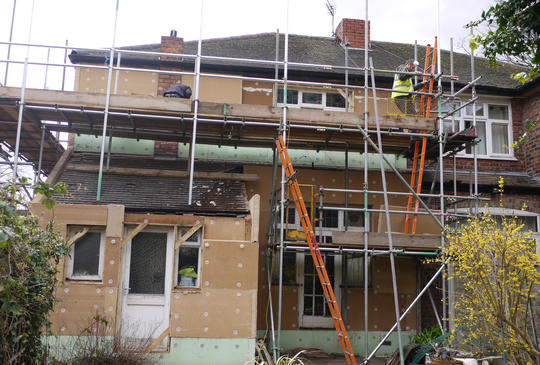
Deep retrofit comes to Greater Manchester...
As the weather starts to get colder a group of Greater Manchester owner occupier householders are looking forward to a warmer and cosier winter than most.
They are members of Greater Manchester-based Carbon Co-op and have benefited from a ground breaking new scheme to deliver large-scale home energy improvements through the installation of retrofit measures.
The programme tests the technical boundaries of what is possible from retrofit but, with roll out of energy efficiency measures identified key to reducing energy bills, fuel poverty and carbon emissions, will inform policy development in the energy efficiency sector and suggest how pay-as-you-save programmes such as Green Deal might function more effectively in the future.
The scheme, known as Community Green Deal has seen nine householders receive zero interest loans and ECO subsidy in order to fund the installation of a range of energy efficiency measures procured by Carbon Co-op. Going far beyond simply changing lightbulbs or even solid wall insulations, these homes have been refurbished throughout, with multiple measures installed and the process overseen by the architectural expertise of Manchester-based urban design practice URBED.
Typically this has involved both internal and external wood fibre insulation, floor, ceiling and basement insulation, triple glazed timber windows, new doors, new boilers, solar PVs and the installation of 'passive stack' ventilation. Every home is different but the average price of works totals around £40,000 per property - a significant sum to invest but one many householders hope to more or less recoup over the 20-30 life span of the measures.

With the first winter since construction starting to bite, data is beginning to come in on performance but the aspiration of the project team is for householders to reduce both fuel bills and carbon emissions by as much as 80% from a pre-works baseline.
The benefit of working via a mutual social enterprise has come in a variety of ways. Start up costs for the project and the householders' zero interest loan pot came to Carbon Co-op via DECC - unfortunately these deals are not yet available via the wider market.
Carbon Co-op and URBED collaborated on the early stage assessment and design process, something far superior in quality and reliability to what is currently available via Green Deal. Carbon Co-op then procured the whole package of works across the nine participating homes in a single contract, benefiting from support and advice from social housing construction consortium Procure Plus.
The process has been far from smooth with significant challenges presented from changes to the Government's ECO framework, the technical and logistical challenges of whole house retrofit works spread across the city region and the fact that having a home ripped apart and put together can be fairly stressful for all involved - not least the people that live there.
With data and householder experiences starting to be generated interest is growing in how lessons from this programme might inform longer terms roll out of whole house, deep retrofit at scale since the government's Green Deal programme is widely seen as a failure. Carbon Co-op will be hosting a series of events and seminars in the new year to share experience and will be extending the programme to five more households.
For more information please email Carbon Co-op.
KEY PROGRAMME FACTS
Total savings per year: 140Mwh of energy saved per year from the nine properties
Total electricity generation per year = 25,732kWh per year via solar panel installations
Total carbon savings savings = 38 tonnes CO2/year
Contributor Profile
After graduating in Environmental Biology at University of Manchester, Jonathan went on to work as a writer/researcher at Ethical Consumer Magazine and Corporate Watch before co-founding radical art and design practice UHC Collective.
After working with URBED to establish low carbon, household retrofit community benefit society Carbon Co-op, he has gone on to project manage a range of innovative projects demonstrating the effectiveness of collective action on climate change.




